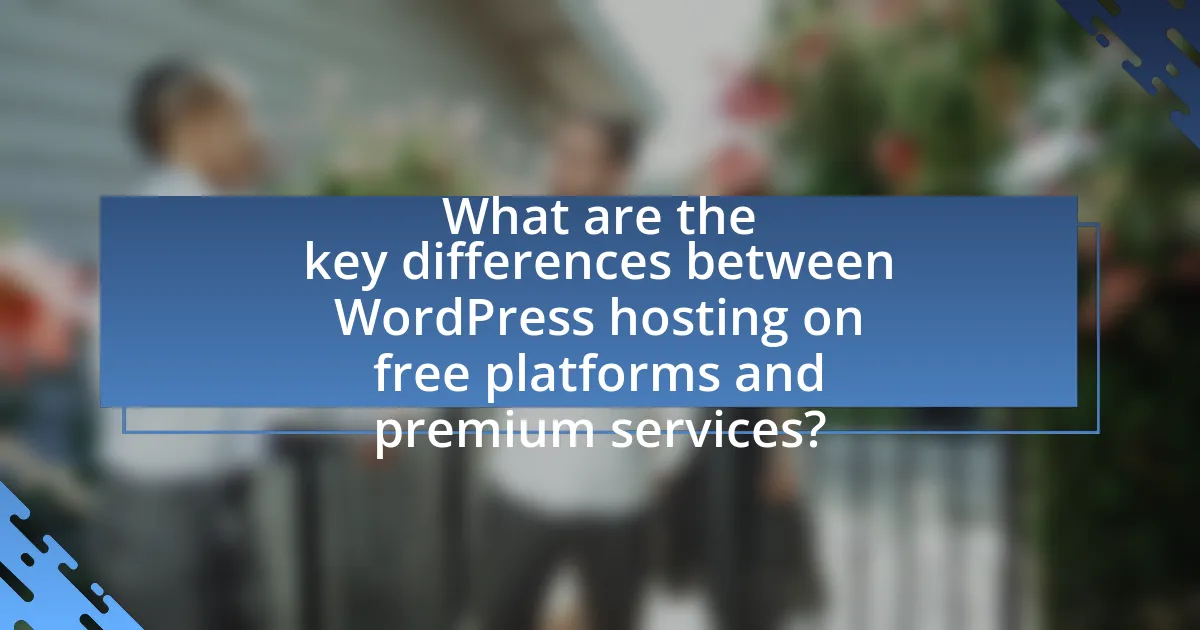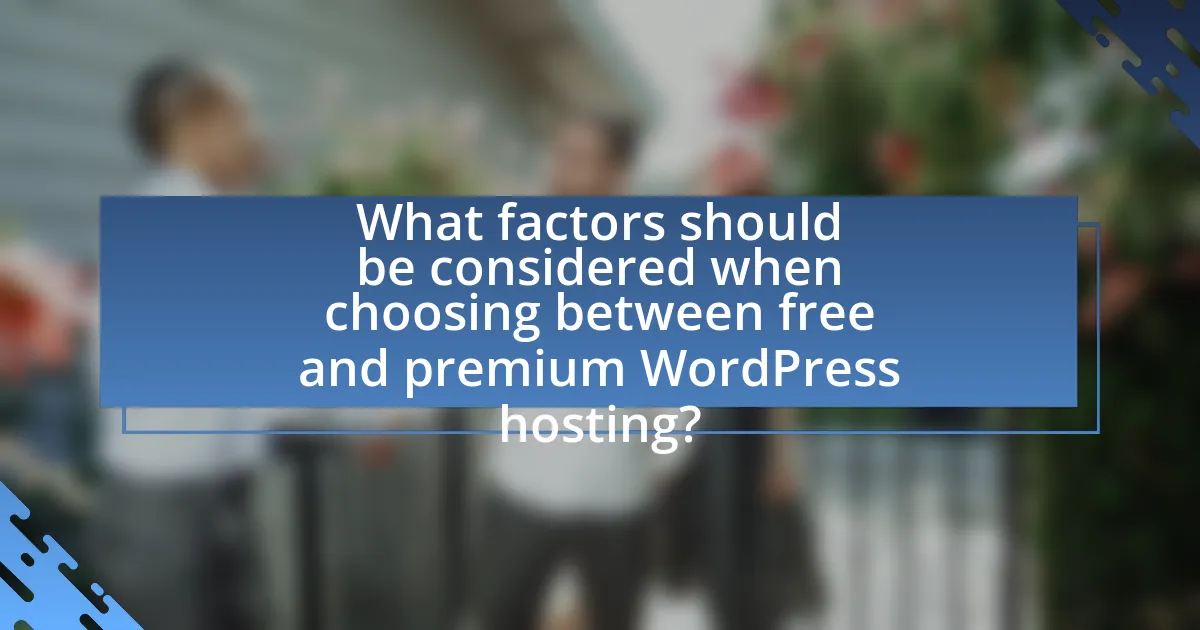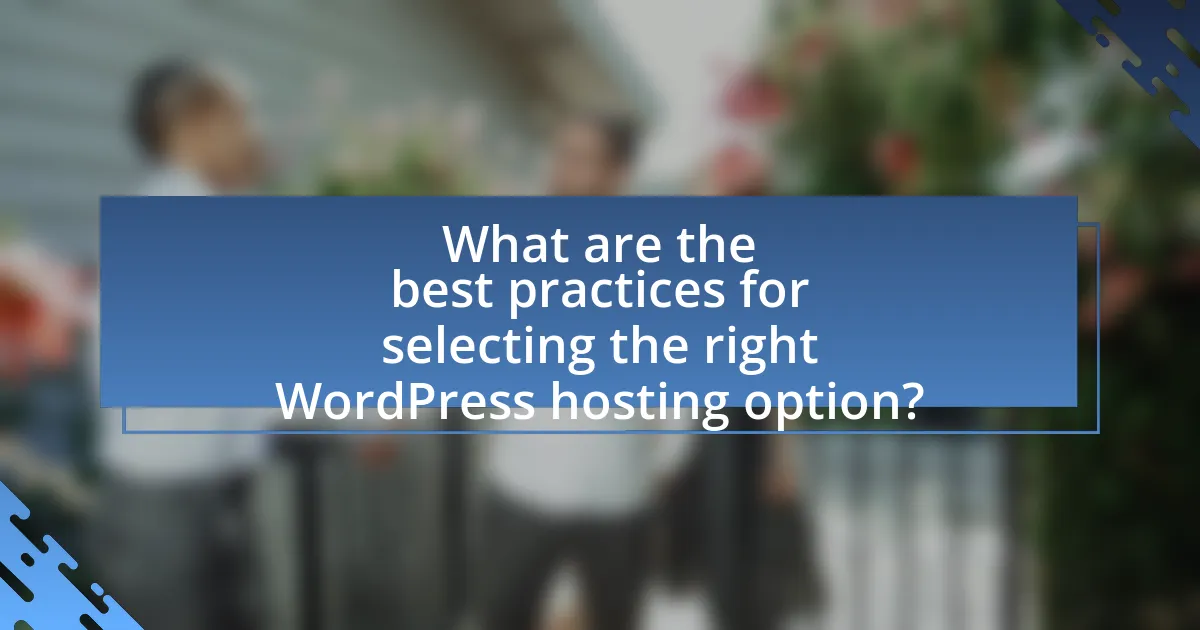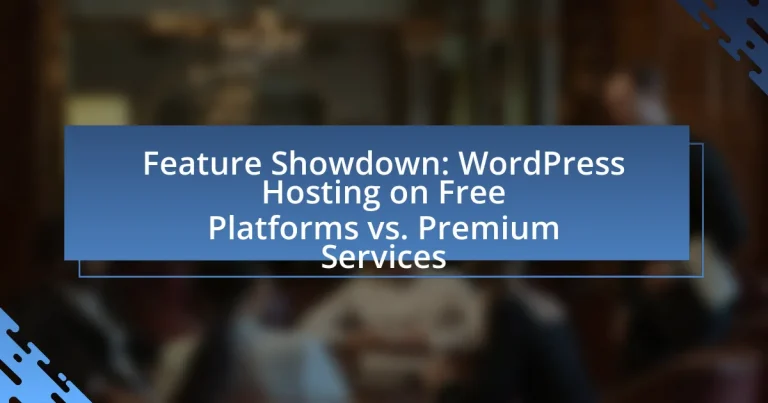The article examines the key differences between WordPress hosting on free platforms and premium services, highlighting the limitations of free hosting, such as restricted resources, lack of support, and performance issues. It contrasts these with the advantages of premium hosting, which offers enhanced security, dedicated support, and superior performance features. The discussion includes factors to consider when choosing a hosting option, common use cases for free hosting, and the long-term costs associated with both types of services. Additionally, it provides insights into customer support differences, scalability options, and best practices for selecting the right WordPress hosting solution.

What are the key differences between WordPress hosting on free platforms and premium services?
WordPress hosting on free platforms typically offers limited resources, fewer features, and less control compared to premium services. Free platforms often impose restrictions on storage, bandwidth, and customization options, which can hinder website performance and scalability. In contrast, premium services provide enhanced security, dedicated support, and advanced features like SSL certificates, backups, and performance optimization tools. For example, a study by WP Engine found that 74% of users experienced better site performance with premium hosting, highlighting the significant advantages of investing in quality hosting solutions.
How do free platforms support WordPress hosting?
Free platforms support WordPress hosting by providing users with basic hosting services at no cost, enabling them to create and manage WordPress sites without financial investment. These platforms typically offer limited storage, bandwidth, and features compared to premium services, but they allow users to access essential functionalities such as one-click WordPress installation, basic themes, and plugins. For instance, platforms like WordPress.com and Wix provide free hosting options that include subdomains and community support, making it easier for beginners to start their online presence. This accessibility encourages users to experiment with WordPress, fostering a larger community of users and developers around the platform.
What features are typically included in free WordPress hosting?
Free WordPress hosting typically includes features such as limited storage space, basic bandwidth, a subdomain instead of a custom domain, and access to a limited selection of themes and plugins. These hosting services often provide a user-friendly interface for easy site setup and management, but they may also impose restrictions on monetization and display ads on hosted sites. According to a comparison by WPBeginner, free hosting options often lack customer support and advanced security features, which are commonly found in premium hosting services.
What limitations do free platforms impose on WordPress hosting?
Free platforms impose several limitations on WordPress hosting, including restricted storage space, limited bandwidth, and lack of custom domain support. These constraints often result in slower website performance and reduced functionality, as users may face ads on their sites and limited access to plugins and themes. For instance, many free hosting services provide only a few hundred megabytes of storage, which can hinder the ability to upload media-rich content. Additionally, free platforms typically do not allow users to connect their own domain names, forcing them to use subdomains that can negatively impact branding and SEO.
What advantages do premium WordPress hosting services offer?
Premium WordPress hosting services offer enhanced performance, security, and support compared to free platforms. These services typically provide faster loading times due to optimized server environments and resources dedicated to WordPress, which can improve user experience and SEO rankings. Additionally, premium hosting includes advanced security features such as daily backups, malware scanning, and firewalls, significantly reducing the risk of hacks and data loss. Furthermore, premium providers often offer 24/7 expert support, ensuring that technical issues are resolved quickly, which is crucial for maintaining website uptime and functionality. These advantages collectively contribute to a more reliable and efficient hosting experience for WordPress users.
How do premium services enhance website performance?
Premium services enhance website performance by providing faster loading times, improved uptime, and better security features. These services often utilize advanced technologies such as Content Delivery Networks (CDNs) and optimized server configurations, which significantly reduce latency and enhance user experience. For instance, premium hosting providers typically offer dedicated resources, ensuring that websites do not suffer from slowdowns due to shared server loads, which is common in free hosting options. Additionally, premium services often include automatic backups and enhanced security protocols, reducing the risk of downtime caused by cyber threats. Studies show that websites with faster loading times can see conversion rates increase by up to 74%, highlighting the direct impact of premium services on performance.
What security features are provided by premium WordPress hosting?
Premium WordPress hosting provides advanced security features such as automatic backups, malware scanning, and DDoS protection. These features are designed to safeguard websites against various threats. For instance, automatic backups ensure that data can be restored quickly in case of an incident, while malware scanning detects and removes harmful software before it can cause damage. Additionally, DDoS protection helps mitigate attacks that aim to overwhelm the server, ensuring website availability. These security measures are critical for maintaining the integrity and reliability of WordPress sites hosted on premium platforms.
Why might a user choose free hosting over premium services?
A user might choose free hosting over premium services primarily due to cost savings. Free hosting eliminates the financial burden associated with premium plans, making it an attractive option for individuals or small businesses with limited budgets. Additionally, free hosting often provides essential features that are sufficient for basic website needs, such as personal blogs or small projects. According to a survey by HostingAdvice, 70% of users who opted for free hosting cited budget constraints as their primary reason, highlighting the significant impact of cost on hosting decisions.
What are the common use cases for free WordPress hosting?
Common use cases for free WordPress hosting include personal blogs, small business websites, and educational projects. Individuals often utilize free hosting to create personal blogs to share their thoughts or hobbies without incurring costs. Small businesses may use free hosting to establish an online presence with limited resources, allowing them to test their market before investing in premium services. Educational projects, such as student portfolios or class websites, frequently leverage free hosting to provide accessible platforms for learning and sharing information. These use cases demonstrate the practicality of free WordPress hosting for users with budget constraints or specific project needs.
How does budget influence the choice between free and premium hosting?
Budget significantly influences the choice between free and premium hosting by determining the level of resources and features available to the user. Users with limited budgets may opt for free hosting to minimize costs, but this often comes with restrictions such as limited storage, bandwidth, and support, which can hinder website performance and reliability. In contrast, those with a higher budget can invest in premium hosting, which typically offers enhanced features like greater storage capacity, faster loading times, better security, and dedicated customer support, leading to a more robust online presence. For example, premium hosting services can provide uptime guarantees of 99.9% or higher, while free hosting may not offer such assurances, impacting the overall user experience and site credibility.

What factors should be considered when choosing between free and premium WordPress hosting?
When choosing between free and premium WordPress hosting, key factors include performance, support, security, and scalability. Performance is critical, as premium hosting typically offers faster load times and better uptime guarantees compared to free options, which may have limited resources. Support is another important consideration; premium hosting often provides 24/7 customer service, while free hosting may lack reliable assistance. Security features, such as SSL certificates and regular backups, are generally more robust in premium plans, reducing vulnerability to attacks. Lastly, scalability is essential for growth; premium hosting allows for easy upgrades as traffic increases, whereas free hosting may impose strict limitations. These factors collectively influence the overall reliability and effectiveness of the hosting service for a WordPress site.
How does customer support differ between free and premium hosting options?
Customer support significantly differs between free and premium hosting options, with premium services typically offering more comprehensive and responsive support. Free hosting often provides limited or no customer support, relying on community forums or self-help resources, while premium hosting usually includes 24/7 access to dedicated support teams via multiple channels such as live chat, phone, and email. For instance, a study by HostingAdvice found that 70% of premium hosting users reported satisfaction with customer support, compared to only 30% of free hosting users, highlighting the disparity in service quality and availability.
What types of support are available for free WordPress hosting users?
Free WordPress hosting users typically have access to community support, which includes forums and user groups where they can seek help from other users. Additionally, some free hosting providers offer limited email support or ticket-based systems, but this is often less responsive compared to premium services. For example, platforms like WordPress.com provide a support forum where users can ask questions and share solutions, while others may have knowledge bases or FAQs to assist users in troubleshooting common issues.
How does premium hosting provide better customer service?
Premium hosting provides better customer service through dedicated support teams and enhanced response times. Unlike free hosting services, premium hosting often includes 24/7 access to knowledgeable support staff who can resolve issues quickly, minimizing downtime for users. For example, many premium hosting providers guarantee response times of under 30 minutes for critical issues, which is significantly faster than the response times typically offered by free platforms. This level of service is crucial for businesses that rely on their websites for revenue, as it ensures that any technical problems are addressed promptly and effectively.
What scalability options are available with free versus premium hosting?
Free hosting typically offers limited scalability options, such as restricted bandwidth and storage, which can hinder growth as traffic increases. In contrast, premium hosting provides extensive scalability features, including the ability to upgrade resources like CPU, RAM, and storage on demand, allowing websites to handle higher traffic volumes efficiently. For example, premium services often include cloud hosting solutions that automatically adjust resources based on real-time traffic needs, ensuring optimal performance. This distinction is crucial for businesses anticipating growth, as premium hosting can accommodate increased demands without significant downtime or performance degradation.
How do free platforms handle increased traffic and resource demands?
Free platforms manage increased traffic and resource demands primarily through resource sharing and limited scalability options. These platforms often utilize a shared hosting model, where multiple users share the same server resources, which can lead to performance degradation during traffic spikes. For instance, platforms like WordPress.com and Wix may implement throttling mechanisms to limit the bandwidth and processing power available to individual users when overall demand exceeds certain thresholds. This approach helps maintain service availability but can result in slower load times and reduced functionality for users experiencing high traffic. Additionally, free platforms may offer limited customer support and fewer optimization tools, which can further impact their ability to effectively handle increased resource demands.
What scalability features do premium services offer for growing websites?
Premium services offer scalability features such as automatic resource allocation, load balancing, and enhanced bandwidth options for growing websites. These features enable websites to handle increased traffic without performance degradation. For instance, automatic resource allocation allows for dynamic scaling of CPU and memory based on real-time demand, ensuring optimal performance during traffic spikes. Load balancing distributes incoming traffic across multiple servers, preventing any single server from becoming overwhelmed. Enhanced bandwidth options provide the necessary data transfer capacity to accommodate larger audiences, which is crucial for maintaining user experience as a website grows.
What are the long-term costs associated with free and premium hosting?
Long-term costs associated with free hosting include limited resources, potential downtime, and lack of support, which can lead to lost revenue and increased expenses over time. Free hosting often comes with advertisements and restrictions that can hinder website growth and user experience, ultimately resulting in costs related to migrating to a premium service later. In contrast, premium hosting incurs upfront fees, typically ranging from $5 to $50 per month, but provides reliable uptime, enhanced security, and customer support, which can save money in the long run by preventing issues that could disrupt business operations. Investing in premium hosting can lead to better performance and scalability, reducing the likelihood of incurring additional costs due to website failures or slow loading times.
How can hidden costs affect the overall value of free hosting?
Hidden costs can significantly diminish the overall value of free hosting by introducing unexpected expenses that users must bear. For instance, while the initial service appears free, users may encounter charges for essential features such as domain registration, SSL certificates, or increased bandwidth, which can lead to total costs that exceed those of premium hosting options. A study by HostingAdvice found that 70% of users of free hosting services reported incurring additional costs, often due to limitations in service that required upgrades. This reality highlights that the perceived savings of free hosting can be misleading, as hidden costs can ultimately lead to a higher total expenditure and reduced functionality compared to premium services.
What pricing models are common in premium WordPress hosting services?
Common pricing models in premium WordPress hosting services include tiered pricing, pay-as-you-go, and flat-rate pricing. Tiered pricing offers multiple plans with varying features and resources, allowing users to choose based on their needs; for example, plans may range from basic shared hosting to advanced dedicated servers. Pay-as-you-go models charge users based on actual resource usage, which can be beneficial for sites with fluctuating traffic. Flat-rate pricing provides a single monthly fee for a set of features, simplifying budgeting for users. These models are prevalent because they cater to diverse user requirements and budgets, ensuring flexibility and scalability in hosting solutions.

What are the best practices for selecting the right WordPress hosting option?
The best practices for selecting the right WordPress hosting option include evaluating performance, reliability, customer support, scalability, and security features. Performance is crucial; a hosting provider should offer fast loading times, ideally under 2 seconds, as studies show that a delay of just one second can reduce conversions by 7%. Reliability is also essential; look for a provider with at least 99.9% uptime guarantees, which ensures your site remains accessible. Customer support should be available 24/7 through multiple channels, as timely assistance can resolve issues quickly. Scalability is important for future growth; choose a host that allows easy upgrades to accommodate increased traffic. Lastly, security features such as SSL certificates, firewalls, and regular backups are vital to protect your site from threats. These criteria collectively ensure a robust hosting environment for WordPress sites.
How can users evaluate their specific needs for WordPress hosting?
Users can evaluate their specific needs for WordPress hosting by assessing their website’s traffic expectations, required storage space, and desired performance features. Understanding the anticipated number of visitors helps determine the necessary bandwidth and server resources, while evaluating storage needs ensures that users select a plan that can accommodate their content. Additionally, users should consider performance features such as speed, uptime guarantees, and customer support, which are critical for maintaining a reliable website. For instance, a study by WP Engine indicates that 47% of consumers expect a web page to load in two seconds or less, highlighting the importance of performance in hosting decisions.
What questions should users ask themselves before choosing a hosting option?
Users should ask themselves about their specific needs and goals before choosing a hosting option. Key questions include: What is my budget for hosting services? This determines whether free or premium options are viable. What level of traffic do I expect? Higher traffic requires more robust hosting solutions. Do I need technical support? Premium services often provide better support. What features are essential for my website, such as storage, bandwidth, and security? Understanding these needs helps in selecting the right hosting type. Lastly, how important is scalability for my future growth? This influences whether to choose a flexible hosting plan.
How can users assess their technical skills when selecting hosting?
Users can assess their technical skills when selecting hosting by evaluating their familiarity with web technologies, server management, and troubleshooting. This assessment can be done through self-reflection on past experiences, such as setting up websites, managing databases, or configuring content management systems. Additionally, users can take online quizzes or skill assessments that gauge their understanding of hosting-related concepts, such as DNS management, FTP usage, and security protocols. According to a survey by Stack Overflow, 70% of developers reported that hands-on experience significantly influences their confidence in technical skills, reinforcing the importance of practical knowledge in making informed hosting decisions.
What resources are available to compare free and premium WordPress hosting services?
Resources available to compare free and premium WordPress hosting services include websites like WPBeginner, HostingAdvice, and SiteGround’s comparison tools. These platforms provide detailed reviews, feature comparisons, and user ratings that highlight the differences in performance, support, and pricing between free and premium options. For instance, WPBeginner offers a comprehensive guide that outlines the pros and cons of various hosting services, while HostingAdvice features side-by-side comparisons of hosting plans. Additionally, user forums and review sites like Trustpilot can provide real user experiences and insights, further aiding in the comparison process.
Where can users find reliable reviews and comparisons of hosting services?
Users can find reliable reviews and comparisons of hosting services on specialized websites such as HostingAdvice, CNET, and TechRadar. These platforms provide in-depth analyses, user ratings, and expert opinions on various hosting services, ensuring that users have access to comprehensive and trustworthy information. For instance, HostingAdvice offers detailed comparisons based on performance metrics, customer support, and pricing, which helps users make informed decisions about their hosting needs.
What tools can assist in evaluating hosting performance and features?
Tools that can assist in evaluating hosting performance and features include GTmetrix, Pingdom, and Google PageSpeed Insights. GTmetrix provides detailed reports on page load times and performance scores, allowing users to analyze the speed and efficiency of their hosting. Pingdom offers uptime monitoring and performance testing from various locations, helping to assess the reliability and speed of hosting services. Google PageSpeed Insights evaluates the performance of web pages and provides suggestions for improvement, making it a valuable tool for understanding hosting capabilities. These tools are widely recognized for their accuracy and effectiveness in measuring hosting performance.
What tips can help users make an informed decision about WordPress hosting?
To make an informed decision about WordPress hosting, users should evaluate key factors such as performance, support, security, and scalability. Performance is crucial; hosting providers with solid uptime guarantees (99.9% or higher) ensure that websites remain accessible. Support is essential; 24/7 customer service can resolve issues promptly, which is vital for maintaining website functionality. Security features, including SSL certificates and regular backups, protect against data breaches and loss. Scalability allows users to upgrade resources as their website grows, ensuring that performance remains optimal. Research indicates that premium services often provide better performance and support compared to free platforms, making them a more reliable choice for serious website owners.
How can users leverage trial periods to test hosting services?
Users can leverage trial periods to test hosting services by signing up for free or low-cost trials offered by various providers. These trials typically allow users to explore features, performance, and customer support without financial commitment. For instance, many premium hosting services provide trial periods ranging from 14 to 30 days, enabling users to assess uptime, speed, and ease of use. This hands-on experience helps users determine if the service meets their specific needs before making a long-term investment.
What common mistakes should users avoid when choosing WordPress hosting?
Users should avoid selecting WordPress hosting based solely on price, as this often leads to inadequate performance and support. Many budget hosting options may lack essential features like scalability, security, and customer service, which are critical for maintaining a reliable website. For instance, a study by WP Engine found that 39% of users experienced downtime with low-cost hosting providers, impacting their site’s credibility and user experience. Additionally, users should not overlook the importance of server location, as hosting far from the target audience can result in slower load times, negatively affecting SEO and user retention.


